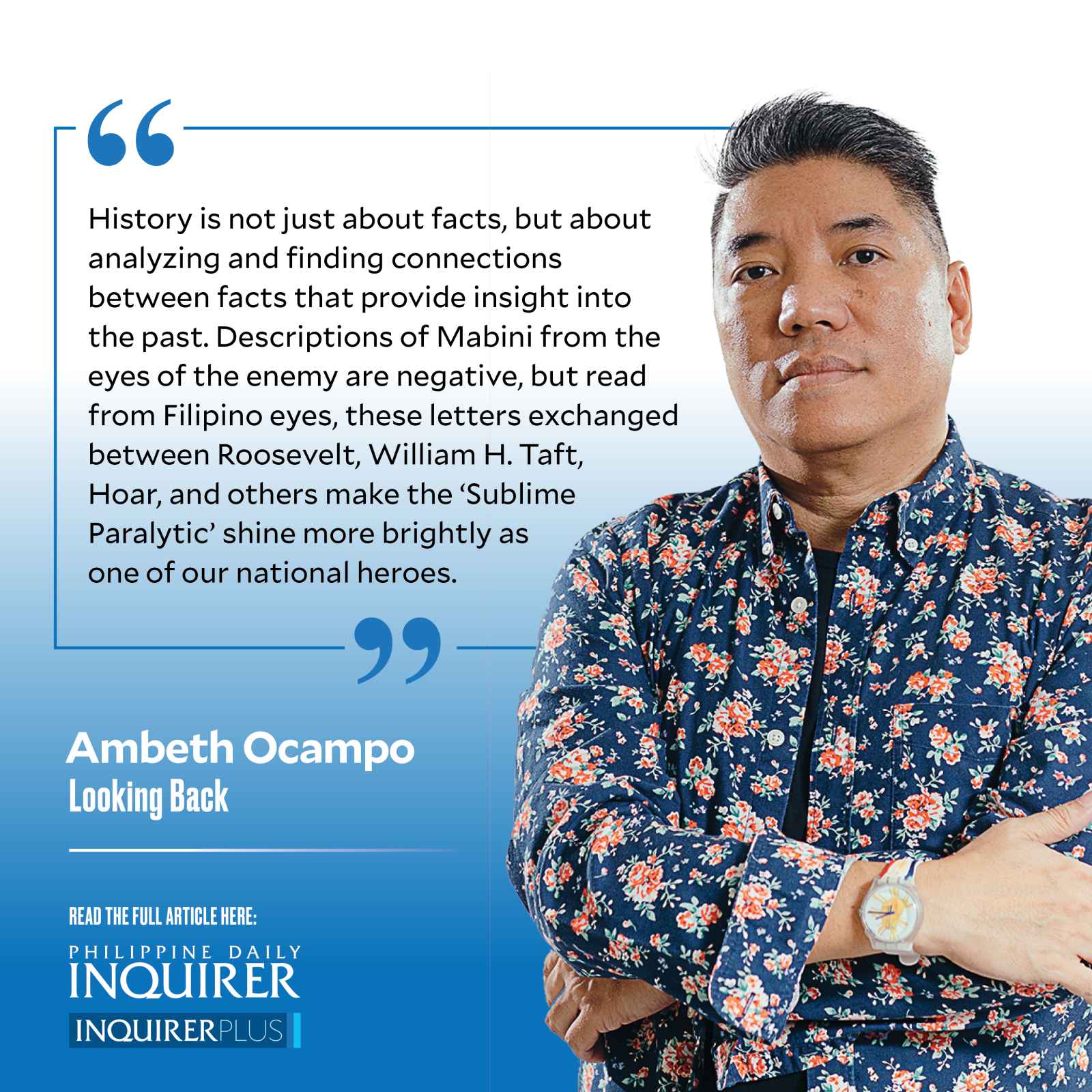Mabini and Teddy Roosevelt

Araling Panlipunan did not teach me that teddy bears started out as “Teddy’s Bears,” named after Theodore Roosevelt. Araling Panlipunan did not teach me about Roosevelt’s involvement and interest in the Philippines even before he assumed office as 26th President of the United States in 1901, after William McKinley died from an assassin’s bullet. A pity that Araling Panlipunan did not teach me about the US liberal campaign to spring Apolinario Mabini from exile in Guam, and how Roosevelt decided on the issue.
It is not well-known that Roosevelt, then undersecretary of the Navy, worked for the appointment of George Dewey as commander of the US Asiatic Squadron. Telegrams sent from Navy headquarters in Washington, DC, to Dewey, then in Hong Kong, hint at the plan to take or neutralize the Philippines before the outbreak of the Spanish-American War. For example, on Jan. 27, 1898, Dewey received orders to “retain until further orders the crew of the squadron whose terms enlistment have expired.” On Feb. 25, 1898, while Navy Secretary John D. Long was out to lunch, Undersecretary Roosevelt took the liberty of dispatching the famous telegram to Dewey that read:
Article continues after this advertisement“Order the squadron, except the Monocacy, to Hong Kong. Keep full of coal. In the event of declaration of war with Spain, your duty will be to see that Spanish squadron does not leave the Asiatic Coast, and then offensive operations in Philippines. Keep Olympia until further orders.”
Succeeding telegrams order Dewey to source the best coal and acquire provisions. One telegram inquired how much soap and tobacco Dewey’s fleet required. On April 24, 1898, a day before the US Congress issued a declaration of war against Spain, Dewey received a telegram that read:
“War has commenced between the US and Spain. Proceed at once to the Philippine Islands. Commence operations at once, particularly against Spanish fleet. You must capture vessels or destroy them. Use utmost endeavors.”
Article continues after this advertisementThe first shot in the Spanish-American War was not heard anywhere near Madrid or Washington, but in far-off Manila Bay where Dewey’s modern, armored, and well-equipped navy scuttled the “floating antiques” that passed for the Spanish squadron under Admiral Patricio Montojo. I’m curious if the Makati street named Montojo references the ill-fated Spanish admiral or his daughter Fermina (memorialized by another Makati street), the second wife of Enrique Zobel de Ayala.
Five days after Dewey’s victory in Manila Bay, Roosevelt resigned as undersecretary of the Navy and joined Leonard Wood in the First US Volunteer Cavalry in Cuba, most celebrated as the “Rough Riders.” Wood would later be the most controversial and combative of US governors-general in the Philippines.
In December 1902, a group of prominent Americans including Sen. George Hoar wrote an appeal to Roosevelt seeking the return of Mabini to the Philippines. The only obstacle was Mabini’s refusal to take the oath of allegiance to the US in Guam before departing for Manila; he insisted on taking the oath on Philippine soil. There are 16 primary source documents on the issue, available online from theodorerooseveltcenter.org maintained by Dickinson State University, that provides Roosevelt’s assessment of Mabini and his case.
Roosevelt, after reading some of Mabini’s writings, said: “I was struck by their ability. But, frankly, I thought the reasons he gave for not taking the oath both trifling and disingenuous … he knows perfectly well that it does not make a particle of difference whether he takes the oath in Guam or Luzon.” In a letter to Senator Hoar, a proponent for Mabini’s return from exile, Roosevelt said: “I have not wished to discuss my views of Mabini’s character and intellect, but perhaps I ought to say, my dear Senator, that it does not agree with yours. Mabini seems to me to belong to a very ordinary type common among those South American revolutionists who have worked such mischief to their fellow-countrymen.”
History is not just about facts, but about analyzing and finding connections between facts that provide insight into the past. Descriptions of Mabini from the eyes of the enemy are negative, but read from Filipino eyes, these letters exchanged between Roosevelt, William H. Taft, Hoar, and others make the “Sublime Paralytic” shine more brightly as one of our national heroes, more so on his 158th birth anniversary on July 23.
—————-
Comments are welcome at aocampo@ateneo.edu
















